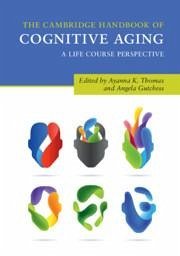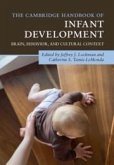The Cambridge Handbook of Cognitive Aging
A Life Course Perspective
Herausgeber: Thomas, Ayanna K; Gutchess, Angela
The Cambridge Handbook of Cognitive Aging
A Life Course Perspective
Herausgeber: Thomas, Ayanna K; Gutchess, Angela
- Broschiertes Buch
- Merkliste
- Auf die Merkliste
- Bewerten Bewerten
- Teilen
- Produkt teilen
- Produkterinnerung
- Produkterinnerung
A comprehensive overview of cognitive aging through the lens of a life course perspective, considering both behavioral and neural changes.
Andere Kunden interessierten sich auch für
![The Cambridge Handbook of International Prevention Science The Cambridge Handbook of International Prevention Science]() The Cambridge Handbook of International Prevention Science83,99 €
The Cambridge Handbook of International Prevention Science83,99 €![The Cambridge Handbook of the Global Work-Family Interface The Cambridge Handbook of the Global Work-Family Interface]() The Cambridge Handbook of the Global Work-Family Interface103,99 €
The Cambridge Handbook of the Global Work-Family Interface103,99 €![The Cambridge Handbook of Applied Psychological Ethics The Cambridge Handbook of Applied Psychological Ethics]() The Cambridge Handbook of Applied Psychological Ethics103,99 €
The Cambridge Handbook of Applied Psychological Ethics103,99 €![The Cambridge Handbook of Infant Development The Cambridge Handbook of Infant Development]() The Cambridge Handbook of Infant Development78,99 €
The Cambridge Handbook of Infant Development78,99 €![The Cambridge Handbook of Workplace Affect The Cambridge Handbook of Workplace Affect]() The Cambridge Handbook of Workplace Affect77,99 €
The Cambridge Handbook of Workplace Affect77,99 €![The Cambridge Handbook of Cyber Behavior 2 Volume Hardback Set The Cambridge Handbook of Cyber Behavior 2 Volume Hardback Set]() The Cambridge Handbook of Cyber Behavior 2 Volume Hardback Set458,99 €
The Cambridge Handbook of Cyber Behavior 2 Volume Hardback Set458,99 €![The Cambridge Handbook of Cyber Behavior 2 Volume Paperback Set The Cambridge Handbook of Cyber Behavior 2 Volume Paperback Set]() The Cambridge Handbook of Cyber Behavior 2 Volume Paperback Set159,99 €
The Cambridge Handbook of Cyber Behavior 2 Volume Paperback Set159,99 €-
-
-
A comprehensive overview of cognitive aging through the lens of a life course perspective, considering both behavioral and neural changes.
Hinweis: Dieser Artikel kann nur an eine deutsche Lieferadresse ausgeliefert werden.
Hinweis: Dieser Artikel kann nur an eine deutsche Lieferadresse ausgeliefert werden.
Produktdetails
- Produktdetails
- Verlag: Cambridge University Press
- Seitenzahl: 778
- Erscheinungstermin: 9. Juli 2020
- Englisch
- Abmessung: 231mm x 183mm x 36mm
- Gewicht: 1588g
- ISBN-13: 9781108449366
- ISBN-10: 1108449360
- Artikelnr.: 58380535
- Herstellerkennzeichnung
- Libri GmbH
- Europaallee 1
- 36244 Bad Hersfeld
- 06621 890
- Verlag: Cambridge University Press
- Seitenzahl: 778
- Erscheinungstermin: 9. Juli 2020
- Englisch
- Abmessung: 231mm x 183mm x 36mm
- Gewicht: 1588g
- ISBN-13: 9781108449366
- ISBN-10: 1108449360
- Artikelnr.: 58380535
- Herstellerkennzeichnung
- Libri GmbH
- Europaallee 1
- 36244 Bad Hersfeld
- 06621 890
Part I. Overview of Models of Cognitive Aging: 1. Introduction and overview
2. Cognitive reserve
3. How age-related changes in the brain affect cognition
4. Neuroadaptive trajectories of healthy mindspan: from genes to neural networks
5. Cognitive aging: role of neurotransmitter systems
6. How arousal-related neurotransmitter systems compensate for age-related decline
Part I summary
Part II. Overview of Models of Cognitive Aging: 7. Aging effects on brain and cognition: what do we learn from a strategy perspective?
8. Inhibitory theory: assumptions, findings, and relevance to interventions
9. From perception to action: bottom-up and top-down influences on age differences in attention
10. Age-related sensory deficits and their consequences
11. Episodic memory decline in aging
12. Age differences in decision making
13. Emotion and memory
14. Time perception from seconds to lifetimes: how perceived time affects adult development
Part II summary
Part III. Aging in a Social Context: 15. Memory and aging in social contexts
16. Emotion regulation in adulthood and old age: a cognitive aging perspective on strategy use and effectiveness
17. Changes in social and emotional well-being over the life span
18. Aging and cognitive functioning: the impact of goals and motivation
19. Social relationships and cognitive development in adulthood
20. Emotion recognition and aging of the social brain
21. Narrative and identity: the importance of our personal past in later life
22. Stereotype threat and the cognitive performance of older adults
Part III summary
Part IV. Early Life and Biological Factors: 23. Prenatal influences on cognitive aging
24. Associations between activity participation across the life course and cognitive aging
25. Cognitive aging and culture: older brain predictions about different environments
26. Current perspectives on aging and bilingualism across the life span
27. Grit and successful aging
28. Control and cognition: contextual and individual differences in cognitive aging
29. Cognition and well-being across adulthood and old age
30. The genetics of cognitive abilities
31. Blood biomarkers of cognitive health and neurodegenerative disease
Part IV summary
Part V. Later Life and Interventions: 32. Cerebrovascular disease, aging, and depression: clinical features, pathophysiology, and treatment
33. The role of nutrition in cognitive decline
34. Sleep's role in cognitive aging
35. Examination of the relationship between accelerometer-derived metrics of physical activity and cognition among older adults
36. Far transfer and cognitive training: examination of two hypotheses on mechanisms
37. Maximizing the impact of cognitive engagement interventions for older adults
38. Mobility and cognitive decline in older adults with cognitive impairment
39. Current and emerging technologies for supporting successful aging
Part V summary.
2. Cognitive reserve
3. How age-related changes in the brain affect cognition
4. Neuroadaptive trajectories of healthy mindspan: from genes to neural networks
5. Cognitive aging: role of neurotransmitter systems
6. How arousal-related neurotransmitter systems compensate for age-related decline
Part I summary
Part II. Overview of Models of Cognitive Aging: 7. Aging effects on brain and cognition: what do we learn from a strategy perspective?
8. Inhibitory theory: assumptions, findings, and relevance to interventions
9. From perception to action: bottom-up and top-down influences on age differences in attention
10. Age-related sensory deficits and their consequences
11. Episodic memory decline in aging
12. Age differences in decision making
13. Emotion and memory
14. Time perception from seconds to lifetimes: how perceived time affects adult development
Part II summary
Part III. Aging in a Social Context: 15. Memory and aging in social contexts
16. Emotion regulation in adulthood and old age: a cognitive aging perspective on strategy use and effectiveness
17. Changes in social and emotional well-being over the life span
18. Aging and cognitive functioning: the impact of goals and motivation
19. Social relationships and cognitive development in adulthood
20. Emotion recognition and aging of the social brain
21. Narrative and identity: the importance of our personal past in later life
22. Stereotype threat and the cognitive performance of older adults
Part III summary
Part IV. Early Life and Biological Factors: 23. Prenatal influences on cognitive aging
24. Associations between activity participation across the life course and cognitive aging
25. Cognitive aging and culture: older brain predictions about different environments
26. Current perspectives on aging and bilingualism across the life span
27. Grit and successful aging
28. Control and cognition: contextual and individual differences in cognitive aging
29. Cognition and well-being across adulthood and old age
30. The genetics of cognitive abilities
31. Blood biomarkers of cognitive health and neurodegenerative disease
Part IV summary
Part V. Later Life and Interventions: 32. Cerebrovascular disease, aging, and depression: clinical features, pathophysiology, and treatment
33. The role of nutrition in cognitive decline
34. Sleep's role in cognitive aging
35. Examination of the relationship between accelerometer-derived metrics of physical activity and cognition among older adults
36. Far transfer and cognitive training: examination of two hypotheses on mechanisms
37. Maximizing the impact of cognitive engagement interventions for older adults
38. Mobility and cognitive decline in older adults with cognitive impairment
39. Current and emerging technologies for supporting successful aging
Part V summary.
Part I. Overview of Models of Cognitive Aging: 1. Introduction and overview
2. Cognitive reserve
3. How age-related changes in the brain affect cognition
4. Neuroadaptive trajectories of healthy mindspan: from genes to neural networks
5. Cognitive aging: role of neurotransmitter systems
6. How arousal-related neurotransmitter systems compensate for age-related decline
Part I summary
Part II. Overview of Models of Cognitive Aging: 7. Aging effects on brain and cognition: what do we learn from a strategy perspective?
8. Inhibitory theory: assumptions, findings, and relevance to interventions
9. From perception to action: bottom-up and top-down influences on age differences in attention
10. Age-related sensory deficits and their consequences
11. Episodic memory decline in aging
12. Age differences in decision making
13. Emotion and memory
14. Time perception from seconds to lifetimes: how perceived time affects adult development
Part II summary
Part III. Aging in a Social Context: 15. Memory and aging in social contexts
16. Emotion regulation in adulthood and old age: a cognitive aging perspective on strategy use and effectiveness
17. Changes in social and emotional well-being over the life span
18. Aging and cognitive functioning: the impact of goals and motivation
19. Social relationships and cognitive development in adulthood
20. Emotion recognition and aging of the social brain
21. Narrative and identity: the importance of our personal past in later life
22. Stereotype threat and the cognitive performance of older adults
Part III summary
Part IV. Early Life and Biological Factors: 23. Prenatal influences on cognitive aging
24. Associations between activity participation across the life course and cognitive aging
25. Cognitive aging and culture: older brain predictions about different environments
26. Current perspectives on aging and bilingualism across the life span
27. Grit and successful aging
28. Control and cognition: contextual and individual differences in cognitive aging
29. Cognition and well-being across adulthood and old age
30. The genetics of cognitive abilities
31. Blood biomarkers of cognitive health and neurodegenerative disease
Part IV summary
Part V. Later Life and Interventions: 32. Cerebrovascular disease, aging, and depression: clinical features, pathophysiology, and treatment
33. The role of nutrition in cognitive decline
34. Sleep's role in cognitive aging
35. Examination of the relationship between accelerometer-derived metrics of physical activity and cognition among older adults
36. Far transfer and cognitive training: examination of two hypotheses on mechanisms
37. Maximizing the impact of cognitive engagement interventions for older adults
38. Mobility and cognitive decline in older adults with cognitive impairment
39. Current and emerging technologies for supporting successful aging
Part V summary.
2. Cognitive reserve
3. How age-related changes in the brain affect cognition
4. Neuroadaptive trajectories of healthy mindspan: from genes to neural networks
5. Cognitive aging: role of neurotransmitter systems
6. How arousal-related neurotransmitter systems compensate for age-related decline
Part I summary
Part II. Overview of Models of Cognitive Aging: 7. Aging effects on brain and cognition: what do we learn from a strategy perspective?
8. Inhibitory theory: assumptions, findings, and relevance to interventions
9. From perception to action: bottom-up and top-down influences on age differences in attention
10. Age-related sensory deficits and their consequences
11. Episodic memory decline in aging
12. Age differences in decision making
13. Emotion and memory
14. Time perception from seconds to lifetimes: how perceived time affects adult development
Part II summary
Part III. Aging in a Social Context: 15. Memory and aging in social contexts
16. Emotion regulation in adulthood and old age: a cognitive aging perspective on strategy use and effectiveness
17. Changes in social and emotional well-being over the life span
18. Aging and cognitive functioning: the impact of goals and motivation
19. Social relationships and cognitive development in adulthood
20. Emotion recognition and aging of the social brain
21. Narrative and identity: the importance of our personal past in later life
22. Stereotype threat and the cognitive performance of older adults
Part III summary
Part IV. Early Life and Biological Factors: 23. Prenatal influences on cognitive aging
24. Associations between activity participation across the life course and cognitive aging
25. Cognitive aging and culture: older brain predictions about different environments
26. Current perspectives on aging and bilingualism across the life span
27. Grit and successful aging
28. Control and cognition: contextual and individual differences in cognitive aging
29. Cognition and well-being across adulthood and old age
30. The genetics of cognitive abilities
31. Blood biomarkers of cognitive health and neurodegenerative disease
Part IV summary
Part V. Later Life and Interventions: 32. Cerebrovascular disease, aging, and depression: clinical features, pathophysiology, and treatment
33. The role of nutrition in cognitive decline
34. Sleep's role in cognitive aging
35. Examination of the relationship between accelerometer-derived metrics of physical activity and cognition among older adults
36. Far transfer and cognitive training: examination of two hypotheses on mechanisms
37. Maximizing the impact of cognitive engagement interventions for older adults
38. Mobility and cognitive decline in older adults with cognitive impairment
39. Current and emerging technologies for supporting successful aging
Part V summary.








